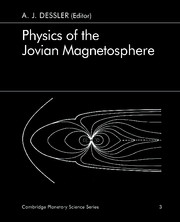Book contents
- Frontmatter
- Contents
- List of tables
- List of contributors
- Foreword
- Preface
- 1 Jupiter's magnetic field and magnetosphere
- 2 Ionosphere
- 3 The low-energy plasma in the Jovian magnetosphere
- 4 Low-energy particle population
- 5 High-energy particles
- 6 Spectrophotometric studies of the Io torus
- 7 Phenomenology of magnetospheric radio emissions
- 8 Plasma waves in the Jovian magnetosphere
- 9 Theories of radio emissions and plasma waves
- 10 Magnetospheric models
- 11 Plasma distribution and flow
- 12 Microscopic plasma processes in the Jovian magnetosphere
- Appendix A Symbols and acronyms
- Appendix B Coordinate systems
- Appendix C Jupiter and Io: selected physical parameters
- References
- Index
3 - The low-energy plasma in the Jovian magnetosphere
Published online by Cambridge University Press: 27 October 2009
- Frontmatter
- Contents
- List of tables
- List of contributors
- Foreword
- Preface
- 1 Jupiter's magnetic field and magnetosphere
- 2 Ionosphere
- 3 The low-energy plasma in the Jovian magnetosphere
- 4 Low-energy particle population
- 5 High-energy particles
- 6 Spectrophotometric studies of the Io torus
- 7 Phenomenology of magnetospheric radio emissions
- 8 Plasma waves in the Jovian magnetosphere
- 9 Theories of radio emissions and plasma waves
- 10 Magnetospheric models
- 11 Plasma distribution and flow
- 12 Microscopic plasma processes in the Jovian magnetosphere
- Appendix A Symbols and acronyms
- Appendix B Coordinate systems
- Appendix C Jupiter and Io: selected physical parameters
- References
- Index
Summary
The magnetosphere of Jupiter is unique in the solar system because of its large extent and rapid rotation, and because of the prodigious source of plasma provided by the satellite Io. Io and its associated neutral clouds inject > 1029 amu/s of freshly ionized material into the magnetosphere, producing a plasma torus with a density maximum near the L-shell of Io and a total mass of ~ 1036 amu. The innermost region of this torus contains a cool plasma corotating with the planet and dominated by S+ ions with temperatures of a few eV. At greater distances, beyond 5.6 Rj, the plasma ions are warmer, consisting primarily of sulfur and oxygen ions with temperatures of ~ 40 eV. The plasma electrons here have mean energies of 10 to 40 eV, and exhibit distribution functions which are non-Maxwellian, with both a thermal and suprathermal component. Near Io itself, the Alfvén wave generated by Io gives rise to observed perturbations in the magnetospheric velocities as the ambient plasma flows around the Io flux tube. In the middle magnetosphere, between ~ 8 and ~ 40 Rj, the ions and electrons tend to be concentrated in a plasma disc or sheet that is routinely cooler than its higher latitude surroundings. This plasma tends to move azimuthally but does not rigidly corotate with the planet. The electron density enhancements at the plasma sheet are due primarily to an increase in the electron thermal population with little change in the suprathermal population.
- Type
- Chapter
- Information
- Physics of the Jovian Magnetosphere , pp. 68 - 105Publisher: Cambridge University PressPrint publication year: 1983
- 126
- Cited by

